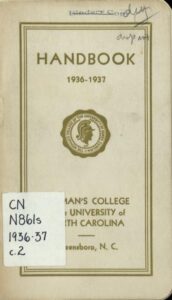When college students move onto campus, they may no longer be subject to their parents’ house rules, but they now have a whole new set of regulations by which to abide. All rules are intended for the students’ and the school’s protection, but they change with the times. Prior to the late 1960s, colleges and universities operated with the policy of in loco parentis, which is Latin for “in the place of a parent.” Students, especially female students, were restricted from doing many things that would be considered basic rights by students today. I have looked through UNCG students’ handbooks through the years and want to share some of my favorite regulations.
1898-1899
The student handbook for academic year 1898-1899 does not specify any rules beyond don’t destroy school property and pay for the property you accidentally destroy, but it does note that students should have a pocket in their school dress and to BE SURE “to remember that fine feathers do not make fine birds, and that what you make of yourself in College you will be so long as you live.” Gulp.
1912-1913
Codified regulations first appear in the 1912-1913 handbook, and only for the Library! The first rule, considered so important that it is in italic type is: “Absolutely no promiscuous talking in the Library.”
Additionally:
- “When necessary to speak to the Librarian, speak in a low tone of voice.”
- “A student may have two books charged to her at the same time, only one of which may be fiction.”
1917-1918
By 1917, the handbook specifies “Indoor Rules” (e.g. “The bathrooms and halls shall not be used for studying”) and “Outdoor Rules” (e.g. “Walking period shall be observed by every student every day except Saturday. During walking period every student must be on campus taking exercise, unless excused by College President or physician.)”
1924-1925
They were not kidding around in the 1924-1925 handbook! In that year the it was clearly printed on the title page of the Official Bulletin of Information: “Ignorance of the law does not excuse violation”.
To dispel your own ignorance, I draw your attention to the following:
- “No gasoline, or benzene, and no electrical fixtures except study lamps and standardized curling irons, may be used in the dormitories.” I can still get behind the gasoline and benzene ban.
- “Each student should make her bed by 9 o’clock in the morning.”
- Although students were permitted “to go to the shoe shop or neighborhood stores until 7:30 p.m.”, they were NOT “to stroll on the public streets at any time.”
1929-1930
At the end of the Roaring Twenties, freshmen and sophomores were required to turn off their room lights at “10:30 on all nights except for Saturdays when they are to be turned off at 11 o’clock. Juniors must get 8 hours rest a day. They may use their own discretion in regard to lights. Seniors are to use their own discretion in regard to lights.” I hope the seniors made wise lights-out choices.
Students’ whereabouts continue to be strictly monitored. For example, “All students are to register accurately and promptly before leaving campus and upon their return, except when going to neighborhood stores, to Sunday morning church services and on hikes not lasting more than an hour.” I have no idea what the extreme hikers were supposed to do.
1930-1931
Some highlights:
- “No student is to drive nails or tacks into the walls or paste pennants or pictures on the walls.” Which must have been frustrating as the handbook later describes how the campus “Ye Junior Shoppe” (which was run by the junior class) “carries college pillows and pennants and society stationary.” How were they supposed to hang their North Carolina College for Women pennants?
- In the dining hall the food was served to each table. Students had to receive permission from the hostesses to have guests from other tables sit at their own table and also to leave the table before others have finished. With that being said, the stated preference was that a whole table should leave the dining room altogether.
- And although this was more of an exhortation than a regulation, I must commend the handbook for “It is wise to spend at least a little part of every day in our library.” Hear, hear!
1936-1937
For the first time there needed to be rules for telephone calls! All calls were connected by campus operators and calls made from and to dormitories were “strictly limited to three minutes. Operators are instructed to cut off service at expiration of that time.” I guess those students must have texted a lot?
This year’s handbook contains fewer regulations than previous (and subsequent) ones, but it does include some excellent suggestions that are as relevant to today’s students, such as:
- “Be sure to set aside some time each week for the folks back home. Write letters regularly of the interesting things you are doing on the campus. You will have many new interests here, but they must never crowd out the old relationships which are a part of you.”
- “That in being tolerant of other peoples’ ideals you have grown bigger and stronger.”
- “To make mistakes or you won’t have any reminiscences.”
1942-1943
By 1942-1943, there were regulations about radios (“can be played anytime in a student’s room and in the parlors provided they do not disturb others”) and smoking (“Students may smoke on the terraces and in the residence halls, except in the parlors and entrance halls.)
“Social privileges” such as “entertaining a caller” were now based on academic standing. Students with a “C” or better average were allowed more weekend and evening “engagements.”
Regarding riding in automobiles, on horseback, and on bicycles required parental permission and there were different rules for each class. However, all students require special written permission to ride in airplanes.
TO BE CONTINUED…
By Beth Ann Koelsch
